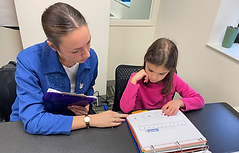Center for Research in Child Development
Loyola University Chicago

Current Research Projects
Below, you can read about two current Movement & Learning Lab projects that showcase the main goals of Dr. Wakefield's research program: (1) to understand how individual differences impact learning from gesture and (2) determine the mechanisms by which we process and learn from gesture.
Understanding how Individual Differences Impact Learning from Gesture


We know that gesture supports learning for many children, but there are always some who do not learn from gesture. In a series of studies with different age groups and populations, we hope to understand the role that (1) the context in which gesture is used and (2) the individual differences children and adults bring to the learning situation impact who learns from gesture.
Some of the individual differences we consider are prior knowledge related to a concept, working memory, propensity to see gesture as meaningful and an individual's own use of co-speech gesture. We also ask whether context matters: are children or teachers performing gesture and how does this interact with individual differences to predict learning?
We ask these questions with first-grade children learning about linear measurement and college students, learning a novel math task. In addition, this year Alex Hurka (LUROP fellowship recipient) is considering how individuals diagnosed with ADHD may learn from gesture.
Investigating the Role of Visual Attention in Integrating Information from Speech and Gesture across Development
Messages are often multimodal - individuals express information in speech, but can reinforce or complement this with information in gesture. In some cases, information in gesture is necessary for a complete understanding of an intended message, but previous research shows that not everyone readily picks up on the meaning of gesture. In a series of studies, we are investigating the role of visual attention in gaining information from gesture in both childhood and adulthood. Additionally, in collaboration with Dr. Maggie Guy (co-director of the CRCD) current honors thesis student Lisa Gallo will consider the neural correlates involved in gesture processing.
Dr. Wakefield is also a co-investigator of the Loyola Program for Neuroscience & Society, funded by the Dana Foundation. The goal of this program is to develop informal learning opportunities for high school and middle school students that highlights ways in which findings about how the brain works can impact society and interface with ethical considerations. Although the program is not focused on gesture, it aligns with Dr. Wakefield's overarching goal of developing and supporting evidence-based educational approaches.
Click HERE to learn more about this project.